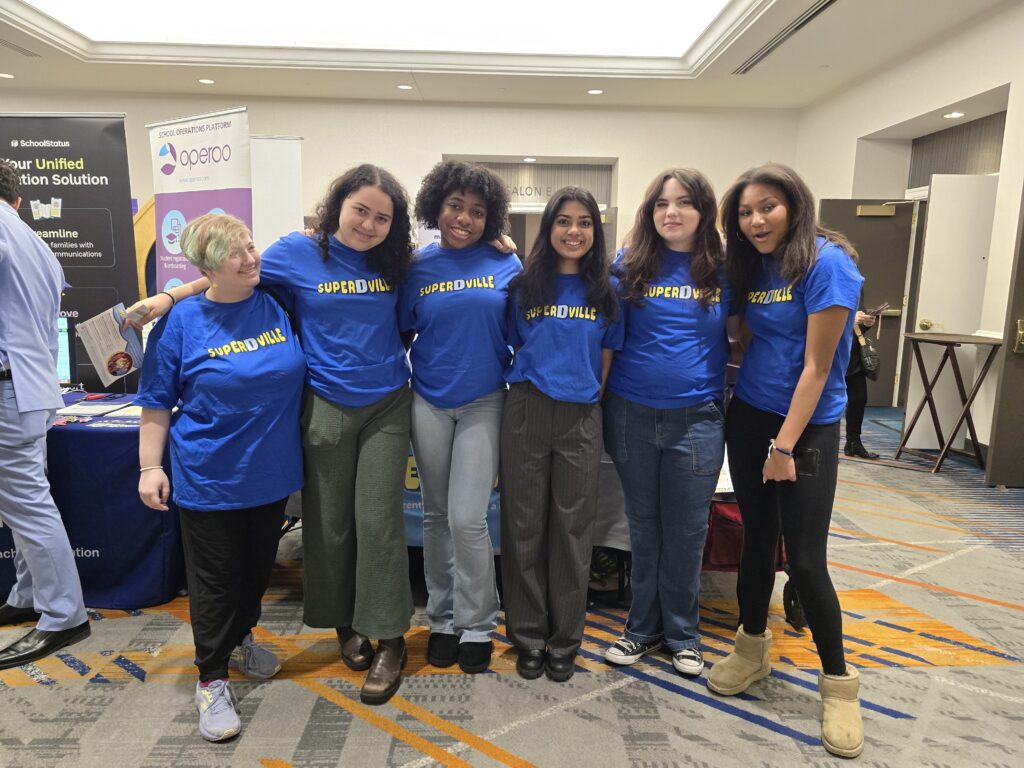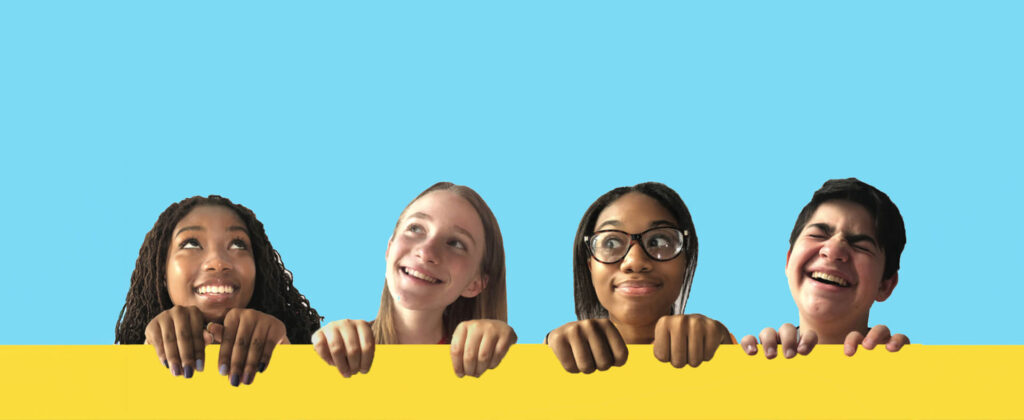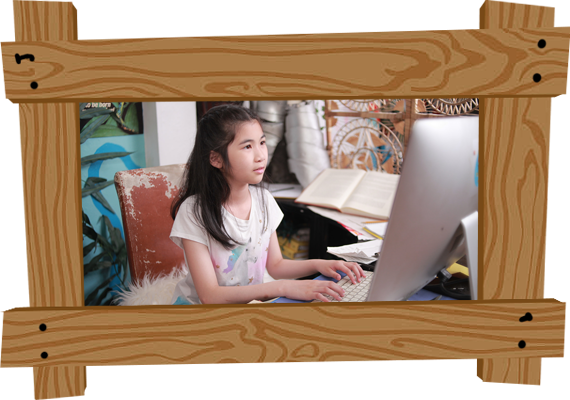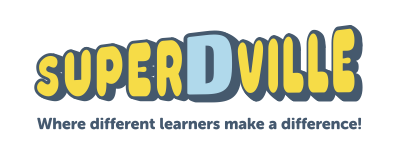
When your child has dyslexia, ADHD, or another learning disability, you’ve probably invested in tutoring, therapy, and specialized instruction. But there’s one critical piece that often gets overlooked in traditional social emotional learning programs: community.
The Missing Piece in SEL for Kids with Learning Disabilities
Most social emotional learning curriculum focuses on teaching skills—self-awareness, self-regulation, social awareness. These are important. But for children with learning differences, there’s something even more powerful than learning about emotions: connecting with peers who truly understand what they’re going through.
That’s the heart of SuperD Friends.

What is SuperD Friends?
SuperD Friends is a virtual community where children ages 7-12 with dyslexia, ADHD, and other learning disabilities meet in small groups for 45-minute sessions. But this isn’t your typical SEL curriculum for elementary or middle school students.
Instead of watching generic SEL movies or completing worksheets, kids connect with:
- Peers who share similar learning challenges
- Older mentors who themselves have learning differences
- SuperD Show cast members who model authentic self-advocacy
These sessions create something traditional social emotional curriculum can’t: a sense of belonging that comes from being truly seen and understood.
Why Kids with Learning Differences Need Community

Research consistently shows that children with learning disabilities face higher rates of:
- Social isolation and loneliness
- Anxiety and depression
- Low self-esteem
- Bullying (studies show kids with dyslexia and ADHD are bullied at 2-3x the rate of their peers)
Why? Because feeling “different” without understanding why, or knowing others who share that difference, is incredibly isolating.
The Power of “Me Too”
Imagine your child spending years thinking they’re the only one who:
- Sees letters swim on the page
- Can’t sit still no matter how hard they try
- Works twice as hard for half the results
- Gets called “lazy” or “not trying hard enough”
Now imagine them meeting other kids who say, “Me too.”
That moment of recognition—of realizing they’re not alone, not broken, not the only one—can be transformative.
What Traditional SEL Programs Miss
Standard social emotional learning curriculum for elementary and middle school often treats all students the same. A child with ADHD receives the same self-regulation lessons as neurotypical peers, even though their brain works fundamentally differently.
Generic SEL curriculum might teach:
- “Everyone feels frustrated sometimes”
- “Try taking deep breaths when you’re upset”
- “It’s okay to make mistakes”
But kids with learning disabilities need more specific understanding:
- “Your brain processes information differently, and that’s okay”
- “Here are strategies that work for ADHD brains specifically”
- “Other successful people with dyslexia have faced this too”
More importantly, they need to SEE and CONNECT with others who truly get it.
How SuperD! Friends Builds Community
SuperD! Friends sessions are structured around connection and shared experience:
Peer Validation
Kids meet others with dyslexia, ADHD, and various learning differences. When they hear peers describe similar struggles, something clicks: “I’m not weird. I’m not alone. I’m part of something.”

Mentor Relationships
Sessions are led by older students who have learning disabilities themselves. These mentors aren’t teachers telling kids what to do—they’re living proof that kids with learning differences grow into successful, confident teens and adults.
Authentic Representation
Through the SuperD Show videos, kids see real children with learning disabilities sharing honest stories about their challenges and triumphs. No actors. No scripts. Just authentic voices saying, “This is what my dyslexia feels like” or “Here’s how I advocate for my ADHD accommodations.”
Strengths-Based Approach
Instead of focusing on deficits, SuperD! Friends celebrates what makes neurodivergent minds unique. Kids learn about the creative strengths of dyslexia, the innovative thinking that comes with ADHD, and how their different brain wiring can be an advantage.
The Research Behind Community and Belonging
Studies on children with learning disabilities consistently show:
Strong peer connections reduce:
- Depression and anxiety symptoms
- School avoidance
- Behavioral problems
- Feelings of isolation
Community support increases:
- Self-esteem and confidence
- School engagement
- Willingness to self-advocate
- Resilience in facing challenges
For kids with dyslexia or ADHD, having just one friend who “gets it” can dramatically improve mental health outcomes. SuperD! Friends creates an entire community of kids who get it.

Beyond Emotional Intelligence: Building Identity
The conversation about emotional intelligence vs intellectual intelligence is important, but for kids with learning differences, there’s something even more fundamental: identity development.
When children with dyslexia or ADHD only interact with neurotypical peers, they often internalize the message that they’re “less than.” Their identity becomes wrapped up in what they can’t do.
SuperD! Friends helps kids develop a positive neurodivergent identity by:
- Normalizing their experiences
- Highlighting successful role models with learning disabilities
- Reframing differences as variations, not deficits
- Building pride in their unique way of thinking
What Parents Are Saying
“For the first time, my daughter doesn’t feel alone in her dyslexia journey.”
“Seeing older kids with ADHD who are thriving gave my son hope for his own future.”
“The community aspect has done more for his confidence than any tutoring program.”
How SuperD! Friends Complements Academic Support
SuperD! Friends doesn’t replace reading intervention for dyslexia or executive function coaching for ADHD. It complements these supports by addressing the emotional and social needs that academic programs often miss.
“SuperDville provides a high-quality social and emotional learning curriculum. This can be very powerful when partnered with proven research-based reading instruction.”
— Barbara Wilson, President and Co-Founder of Wilson Language Training®
When kids feel emotionally supported and connected to community, they’re more open to academic interventions. When they believe in themselves, they persist through challenges. When they see others like them succeeding, they believe success is possible for them too.
The SuperDville Difference: Community-Centered SEL
SuperDville’s entire approach—from SuperD Friends sessions to our video-based social emotional curriculum for elementary and middle school—is built on a simple truth: representation and community matter.
We created curriculum starring real kids with learning disabilities because we know that seeing yourself reflected authentically changes everything. We built SuperD! Friends because we know that connecting with peers who share your experiences heals isolation.
This is social emotional learning reimagined for the neurodivergent community.

Is SuperD! Friends Right for Your Child?
SuperD! Friends might be perfect for your child if they:
- Have dyslexia, ADHD, dyscalculia, or another learning disability
- Feel isolated or “different” from peers
- Struggle with self-esteem or confidence
- Need support with self-advocacy
- Would benefit from positive role models with learning differences
- Want to connect with other neurodivergent kids
Getting Started with SuperD! Friends
Creating community for your child with learning differences doesn’t have to be complicated. SuperD! Friends provides:
- ✓
Safe, structured virtual sessions - ✓
Small groups of peers with shared experiences - ✓
Mentorship from older students with learning disabilities - ✓
CASEL-aligned social emotional learning focused on neurodiversity - ✓
Connection to the larger SuperDville community
Join the SuperD! Community
Your child with dyslexia, ADHD, or other learning differences deserves more than just academic support. They deserve community. They deserve to feel understood. They deserve to know they’re not alone.
SuperD! Friends offers exactly that—a place where different isn’t just accepted, it’s celebrated.
Connect Your Child with Community Today
Explore SuperD! Friends and discover how peer connection transforms confidence, self-advocacy, and belonging for kids with learning differences.
Because every child deserves a community where they belong.
